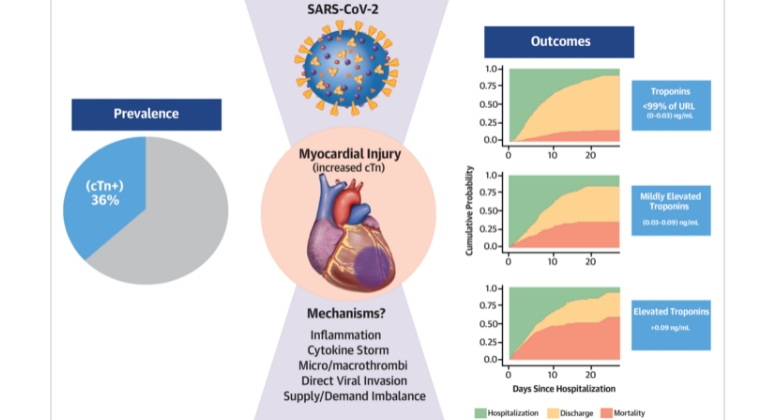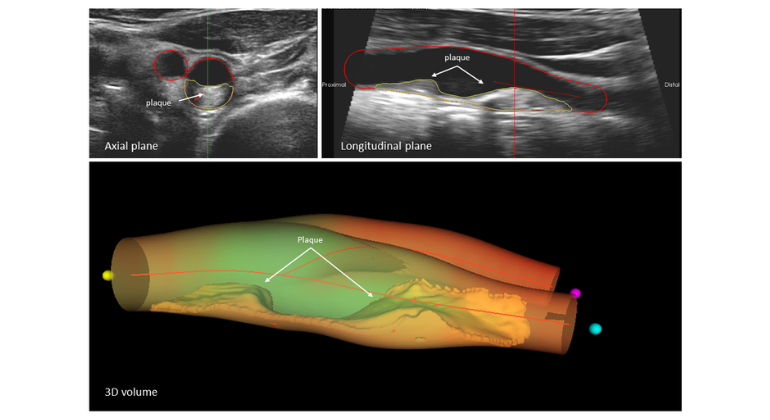Heart Injury Among Hospitalized COVID-19 Patients Associated with Higher Risk of Death
Study findings may help doctors better triage coronavirus patients admitted to the hospital

Myocardial injury reflected by troponin concentrations above the upper reference limit (URL) of normal (>0.03ng/mL) was present in 36% of patients hospitalized with COVID-19. Troponin levels among patients hospitalized with COVID-19 were generally under 1.0 ng/mL.(low levels). Even small amounts of myocardial injury (e.g. troponin I 0.03-0.09 ng/mL, n=455, 16.6%) were associated with higher risk of death (adjusted HR: 1.75, 95% CI 1.37-2.24) while greater amounts (e.g. troponin I>0.09 ng/dL, n=530, 19.4%) were associated with more pronounced risk for death (adjusted HR 3.03, 95% CI 2.42-3.80; P<0.001).
Mount Sinai researchers have found that myocardial injury (heart damage) is prevalent among patients hospitalized with COVID-19 and is associated with higher risk of mortality. More specifically, a serious myocardial injury can triple the risk of death. The results were published in the June 5 issue of the Journal of the American College of Cardiology.
“There has been a lot of speculation about how COVID-19 affects the heart and blood vessels, and with what frequency. Our observational study may help to shed some light on this. We found that 36 percent of patients who were hospitalized with COVID-19 had elevated troponin levels—which represents heart injury—and were at higher risk of death,” says lead author Anu Lala, MD, Assistant Professor of Medicine (Cardiology) at the Icahn School of Medicine at Mount Sinai. “These findings, which are consistent with reports from China and Europe, are important for clinicians. If COVID-19-positive patients arrive in the emergency room and their initial test results show troponin levels are elevated, doctors may be able to better triage these patients and watch over them more closely, but this remains a testable hypothesis.”
A team of investigators analyzed electronic health records of nearly 3,000 adult patients with confirmed positive COVID-19 admitted to five New York City hospitals within the Mount Sinai Health System between February 27 and April 12, 2020 (The Mount Sinai Hospital, Mount Sinai West, Mount Sinai Morningside, Mount Sinai Queens, and Mount Sinai Brooklyn). The median age for patients analyzed was 66, and roughly 60 percent were male. One-quarter of all patients self-identified as African American, and 27 percent self-identified as Hispanic or Latino. Roughly 25 percent of the patients had a history of heart disease (including coronary artery disease, atrial fibrillation and heart failure) and roughly 25 percent had cardiovascular disease risk factors (including diabetes or hypertension).
Mount Sinai researchers found that 36 percent of hospitalized COVID-19 patients had myocardial injury. For those with substantial injury, their risk of death was three times higher than COVID-19-positive patients without myocardial injury.
To get this information, researchers focused on the patients’ levels of troponin—proteins that are released when the heart muscle becomes damaged—and their outcomes. (Higher troponin levels mean greater heart damage.) All patients had a blood test for this within 24 hours of admission and were grouped into three categories: 64 percent were in the normal range (0.00-0.03 ng/mL); 17 percent had mild elevation (between one and three times the upper limit of normal, or >0.03-0.09 ng/mL), and 19 percent had higher elevation (more than three times the upper limit of normal, or >0.09 ng/mL). Higher troponin levels were more prevalent in patients who were over 70 years old and had previously known conditions including diabetes, high blood pressure, atrial fibrillation, coronary artery disease and heart failure. Researchers made adjustments for these factors in the analysis.
Then, they analyzed the associated risk of death after adjusting for factors including age, sex, body mass index, history of cardiovascular disease, medication, and illness at hospital admission. They found patients with milder forms of myocardial injury were associated with lower likelihood of hospital discharge and a 75 percent higher risk of death compared to patients with normal levels. Patients with higher troponin concentrations were associated with a three times higher risk of death compared to those with normal levels. Additionally, when adjusting for relevant factors including heart disease, diabetes and high blood pressure, troponin was independently associated with risk of death. More specifically, heart injury seems to be a more important indicator in predicting risk of death than a history of heart disease.
“The study concludes that myocardial injury is common among patients hospitalized with COVID -19 but is more often mild and associated with low-level troponin elevation. Despite low levels, even small amounts of heart injury could be linked to a pronounced risk of death, and COVID-19 patients with a history of cardiovascular disease are more likely to have myocardial injury when compared to patients without heart disease,” explains Dr. Lala.
“Myocardial injury is frequent in COVID-19 patients, but the question is what is the main etiology? Is this by direct effect of the virus into the myocardium, or is it an indirect effect of the cytokine storm also into the myocardium, or a procoagulant causing coronary thrombotic ischemia? These are questions that need to be addressed in future studies,” says senior author Valentin Fuster, MD, PhD, Director of Mount Sinai Heart and Physician-in-Chief of The Mount Sinai Hospital. “Additionally, we now need to follow COVID-19 patients with myocardial injury to learn more about the consequences.”
About the Mount Sinai Health System
Mount Sinai Health System is one of the largest academic medical systems in the New York metro area, with 48,000 employees working across seven hospitals, more than 400 outpatient practices, more than 600 research and clinical labs, a school of nursing, and a leading school of medicine and graduate education. Mount Sinai advances health for all people, everywhere, by taking on the most complex health care challenges of our time—discovering and applying new scientific learning and knowledge; developing safer, more effective treatments; educating the next generation of medical leaders and innovators; and supporting local communities by delivering high-quality care to all who need it.
Through the integration of its hospitals, labs, and schools, Mount Sinai offers comprehensive health care solutions from birth through geriatrics, leveraging innovative approaches such as artificial intelligence and informatics while keeping patients’ medical and emotional needs at the center of all treatment. The Health System includes approximately 9,000 primary and specialty care physicians and 10 free-standing joint-venture centers throughout the five boroughs of New York City, Westchester, Long Island, and Florida. Hospitals within the System are consistently ranked by Newsweek’s® “The World’s Best Smart Hospitals, Best in State Hospitals, World Best Hospitals and Best Specialty Hospitals” and by U.S. News & World Report's® “Best Hospitals” and “Best Children’s Hospitals.” The Mount Sinai Hospital is on the U.S. News & World Report® “Best Hospitals” Honor Roll for 2025-2026.
For more information, visit https://www.mountsinai.org or find Mount Sinai on Facebook, Instagram, LinkedIn, X, and YouTube.
